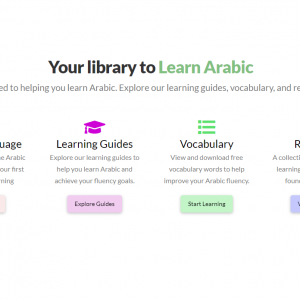Learning Arabic is very challenging for native English speakers. Unfortunately, there are also a limited number of learning resources available. For example, Duolingo doesn’t have an Arabic course (at the time of writing this post in Dec 2018). While services like Rosetta Stone unsuccessfully attempt to apply their techniques to Arabic. The Defense Language Institute has guidelines about how long it should take to become fluent in a language. For languages like Spanish and French, the Defense Language Institute expects students to become fluent after their 26-week program. For Arabic, the expectation is to become fluent after 64 weeks!
I spent many hours searching the internet for any resource related to Arabic. Over time I have accumulated a list of resources that help me practice all skills (reading, writing, speaking, and listening). To help others in their journey, I created OpenArabic.org as a central hub of information. On the website, I list Arabic learning resources in addition to Arabic vocabulary. I only did a soft launch on Reddit to gauge the interest and help plan the future of the website. So far I have been pleased with the results from almost zero marketing.
One of the most popular pages is the guide on how to learn Arabic. It provides information along with tips on how you can learn the language.
I am a big fan of Anki so I always upload the vocabulary to their website for everyone to use. Anki doesn’t provide any in-depth analytics of download counts but I can tell you that there have been 350 downloads since the initial upload of vocabulary 6 months ago.
For the future, I plan on writing more articles explaining how best to use the various resources to learn Arabic. Additionally, I received multiple requests to create specific vocabulary sets centered around increasing fluency from a beginner to an intermediate level. Previously, I wrote a post about image capturing a book to use with Anki which was extremely helpful. Unfortunately, that information is copyright so I am unable to share the deck. I will be creating vocabulary lists using frequency repetition techniques centered around various topics like sports, weather, travel, and home.
